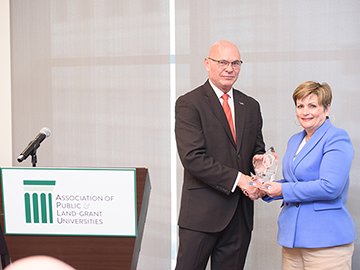The Association of Public and Land-grant Universities (APLU) recently named the University of Alabama at Birmingham (UAB) one of six universities that are finalists for the 12th annual APLU Innovation & Economic Prosperity (IEP) Awards.
UAB’s Harbert Institute for Innovation and Entrepreneurship (HIIE) led the award application process. Last year, UAB was named the winner of the 2023 IEP Innovation Award. This year, UAB is vying for the IEP Talent Award.
The winners will be announced during the APLU Annual Meeting, set to be held in Orlando, Fla. in November. The finalists – UAB, East Carolina University, the University of New Mexico, the University of Memphis, The University of Texas at San Antonio, and Wayne State University – are competing for different awards recognizing exemplary and innovative case studies of economic engagement impact:
- The IEP Talent Award, recognizing exemplary initiatives in education and workforce development;
- The IEP Place Award, recognizing exemplary initiatives resulting in social, cultural, or community development;
- The IEP Innovation Award, recognizing exemplary initiatives spurring innovation, entrepreneurship, and technology-based economic development.
All six universities are also finalists for the IEP Economic Engagement Connections Award, which is the top prize in the awards competition and recognizes overall excellence across all three award categories. Kathy Nugent, Ph.D., accepts the 2023 IEP Innovation Award. (Photo courtesy of APLU)
Kathy Nugent, Ph.D., accepts the 2023 IEP Innovation Award. (Photo courtesy of APLU)
“We are honored that UAB has been again chosen as a finalist for the IEP Awards,” said Kathy Nugent, Ph.D., Executive Director of the HIIE. “It’s gratifying that the APLU sees the value of the innovative work we are doing here at UAB in future-proof talent development. We are proud of the quality of research, education, and innovation on this campus and look forward to learning more about the work being done by other IEP Award finalists.”
UAB’s award application highlighted the University’s work to advance skills in quickly growing areas such as machine learning and artificial intelligence through workforce development initiatives, including the launch of the Marnix E. Heersink Institute for Biomedical Innovation and various degree programs and certifications focused on breakthrough technology areas, such as AI in Medicine, Healthcare Innovation and Biotechnology.
“Congratulations to our 2024 IEP Awards finalists on their outstanding efforts to support talent development, drive innovation, and spur place-based development,” said APLU President Mark Becker. “We’re excited to spotlight the exemplary work of our IEP Award finalists in driving innovation and prosperity across their regions.”
To be eligible for an IEP award, an institution must first earn the IEP designation from APLU, which recognizes institutional commitment to regional economic development. UAB first earned the IEP designation in 2018.
IEP Universities must undergo the redesignation application process every five years. The HIIE team completed UAB’s application for IEP redesignation in January 2024. UAB was granted the five-year designation extension in April 2024.
To earn the IEP designation, universities conduct a rigorous self-study of their economic engagement activities that includes input from external stakeholders. As part of the self-study, each institution identifies areas for growth and improvement within its economic engagement enterprise and develops an improvement plan. This work demonstrates a commitment to continuous learning and improvement in this kind of engagement, which is vital to universities and their regional partners.
More than 85 institutions have been named IEP Designees since the program was launched in 2012. The APLU, which boasts nearly 250 public research universities, land-grant institutions, state university systems and affiliated organizations as members, is an organization that fosters a community of university leaders collectively working to advance the mission of public research universities.
-- Aug. 20, 2024